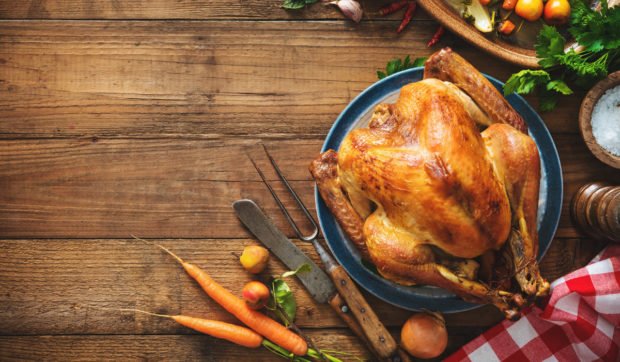It’s that time of the year again. Now while we’re fond of holiday staples such as pumpkin pie and mashed potatoes, we all know that our holiday meal can’t be complete without a Thanksgiving turkey.
A staple in almost every American household that celebrates the holiday, there seems to be no Thanksgiving without the turkey. However, one has to wonder if there are any benefits to eating turkey. That said, you’ll be happy to know that not only is turkey a delicious holiday-season meal, but it’s also rich in essential nutrients that can provide benefits for the body all year round.
Thanksgiving Turkey
A large bird native to North America, the turkey has always been a favorite during holidays. This is because it was always the cheaper option, easier to raise and it was large enough to feed a family. Additionally, the turkey’s population soared with Charles Dickens’s publication of “A Christmas Carol” in 1843, (the antagonist turned protagonist Scrooge sends a family a large turkey for Christmas), and by the time Abraham Lincoln declared Thanksgiving as a national holiday in 1863, the turkey had already established itself as the holiday bird of choice.
Now, while turkey consumption is often associated with holidays, statistics from the USDA Economics, Statistics and Market Information System have found that around 240 million turkeys are raised in the United States for consumption every year.
In terms of nutritional value, turkeys contain a wide range of minerals and vitamins that include B vitamins, selenium, zinc, protein, phosphorus, amino acids, magnesium, and potassium. It’s also important to note that the nutrients found in turkey meat also depend on the cut. The dark meat of turkey, which is found on the legs and thighs, contains more vitamins and minerals than the white meat – which contains slightly more protein. However, in regards to dark meat, they also contain more fat and calories. That said, much of the fat content is found in the skin. Therefore, it would be advisable to remove the skin when consuming turkey.
Benefits of Thanksgiving Turkey
1. It’s a great source of protein
Protein is needed by the body for the growth and maintenance of muscles. It also helps to maintain the health of the cells, to transport oxygen and helps with blood clotting. With that said, it’s nice to know that turkey is so rich in this mineral.
What’s more, if you’re looking to maintain weight, including more protein in your diet can help to do so. This is because, according to research published in the American Clinical Journal of Nutrition, a high-protein diet has been associated with encouraging feelings of fullness.
Turkey is not the only meat that contains protein, yet studies have linked high consumption of red meat to premature death. That said, it may be advisable to look at turkey as a healthier way to get your protein intake. Additionally, you can also get your protein from other food sources that include nuts and legumes.
2. It’s rich in beneficial B vitamins
Turkey is particularly rich in three types of B vitamins that can serve to boost your health.
Niacin (vitamin B3) helps to convert proteins, fats, and carbohydrates into energy that the body can use. Additionally, it also helps with cell communication.
Pyridoxine (vitamin B6) also plays a role in energy production and it’s also needed for the creation of red blood cells and neurotransmitters.
Another B-vitamin found in turkey is folate. Now, while some may assume that folate is only needed by pregnant women, this is far from true. In fact, we can all benefit from including more folate in our diets, pregnant or not. This is because it helps in the formation of red blood cells, promotes bone health, and even reduces the risk of depression (1,2).
Lastly, cobalamin (vitamin B12), is needed for DNA production and the creation of red blood cells.
3. It’s rich in selenium
Selenium is a mineral needed for a variety of functions in the human body. Unfortunately, selenium deficiency is quite common yet enjoying a serving of turkey now and then can serve to prevent this.
Selenium plays a role in a variety of processes that include DNA production, the production of thyroid hormones, and metabolism regulation, and it even helps to boost immune function.
Selenium can also be found in Brazil nuts, eggs, sunflower seeds, salmon, and chia seeds. Just be careful not to consume too many Brazil nuts as this may put you at risk of selenium toxicity.
4. Encourages healthy sleep
In terms of amino acids, turkey contains tryptophan. According to studies, increasing one’s intake of tryptophan can result in better sleep.
 According to research published in the Journal of Physiological Anthropology, tryptophan helps to improve sleep by increasing levels of the sleep hormone melatonin. It also helps to reduce the amount of time it takes to fall asleep, as well as improve sleep quality.
According to research published in the Journal of Physiological Anthropology, tryptophan helps to improve sleep by increasing levels of the sleep hormone melatonin. It also helps to reduce the amount of time it takes to fall asleep, as well as improve sleep quality.
That said, you may cite your fatigue after consuming a serving of your Thanksgiving turkey as a result of its tryptophan content. However, whilst it may encourage healthy sleep, the amount of tryptophan found in a serving of a Thanksgiving turkey is not nearly enough to make you fall asleep. In fact, not only do all meats contain tryptophan, but other foods contain much higher levels of tryptophan than turkey. These foods include cheese, as well as pumpkin, and sesame seeds.
5. Promotes healthy mental health
In addition to helping promote healthy sleep, tryptophan may also serve to boost one’s mental health. This is because tryptophan is responsible for producing as well as boosting the production of serotonin. Serotonin is a brain chemical that helps to regulate mood. In fact, low levels of serotonin have been linked to depression.
That said, a review published in the Cochrane Database of Systematic Reviews noted that tryptophan was quite effective at treating depression.
Buying A Thanksgiving Turkey
When it comes to buying a turkey for your Thanksgiving meal, it’s best to note that there are 4 types of different turkeys that you can purchase. That said, it’s important that you make the right choice for both your meal and your overall health.
Conventional turkey
Conventional turkeys are often cramped into small spaces and are fed animal byproducts. They are also pumped with antibiotics, salt, water, and other preservatives in hopes of making them grow faster, extending shelf life, and cutting costs. As a result, they’re often less expensive.
Aside from the fact that a high-salt diet can increase the risk of stomach cancer as well as heart disease, consuming meats injected with antibiotics can also have an adverse effect on your health. That said, it’s best to minimize your intake of all processed and conventional turkey products. 
Free-range turkey
These turkeys have had access to the outdoors for at least half of their lives. Unfortunately, this can also mean that it may have spent some time in a dark, cramped room. That said, if you really want to be sure that your free-range Thanksgiving turkey enjoyed a good life, then be sure to look out for either the Certified Humane or Global Animal Partnership labels that help to signify that the animal was given appropriate access to the outside.
Organic turkey
According to both the World Health Organization and the Centers for Disease Control and Prevention, antibiotic resistance continues to be a global health threat. As a result, it’s important to consume foods that are free of antibiotics and the best way to do so would be to start consuming organic produce.
In regards to your Thanksgiving meal, organic turkey can only be certified organic by the USDA, if it’s lived off of vegetarian, non-GMO food and if it’s free of any herbicides, pesticides, or antibiotics. Additionally, it also needs to have access to the outdoors during its lifetime.
Pasture-raised turkey
Similar to free-range turkeys, pasture-raised turkeys have plenty of access to the outdoors and thus their diets are usually rich in grasses, berries, and insects. As a result of their plant-heavy diets, these birds tend to be extremely rich in omega-3 fatty acids.
If you want to verify that your Thanksgiving turkey was pasture-raised, just keep an eye out for the Global Animal Partnership (GAP) label.
Cooking your Thanksgiving Turkey
When it comes to preparing your Thanksgiving meal, it’s important that you cook the meat properly. This is because not doing so can incur food poisoning. If you’re cooking the turkey for the first time this year, enjoy this step-by-step outline provided by Dr. Josh Axe:
- If using a frozen turkey, start by thawing in the refrigerator or covering in cold water to unfreeze.
- Next, remove the giblets from the inside of the turkey. You can save these for later and use them to make gravy or stuffing.
- Rinse your turkey both inside and out, then pat dry with a paper towel.
- Stuff your turkey loosely (if desired) by allotting between 1/2–3/4 cup of stuffing for each pound of turkey.
- Next, truss your turkey by using a string to tie the drumsticks together.
- Use a brush to coat the skin of the turkey with oil or melted butter.
- Insert a meat thermometer into the thickest part of the turkey thigh to monitor the temperature. Be sure that the thermometer is pointing toward the body of the turkey and is not touching the bone.
- Put the turkey in a roasting pan and place in an oven preheated to 350 degrees Fahrenheit.
- Allow the turkey to roast until the skin has turned golden, then cover with foil to keep it from browning further. Uncover during the last 45 minutes of cooking to finish browning the skin.
- Your turkey should be done cooking when the temperature has reached at least 180 degrees Fahrenheit in the thigh and 165 degrees Fahrenheit in the breast and/or stuffing.
Want to know more?
Pumpkins are also a common staple during the fall season. As a result, they’re found in almost everything. However, that may not always be a good thing. That said, here’s why you should stay clear of pumpkin spice lattes this Thanksgiving.
References
https://usda.library.cornell.edu/concern/publications/0g354f23n?locale=en
https://ods.od.nih.gov/factsheets/VitaminB6-HealthProfessional/
Bender, Ansley & Hagan, Kelsey & Neal, Kingston. (2017). The association of folate and depression: A meta-analysis. Journal of Psychiatric Research. 95. 10.1016/j.jpsychires.2017.07.019.
Blom W, Lluch A, Stafleu A, et al, Effect of a high-protein breakfast on the postprandial ghrelin response, The American Journal of Clinical Nutrition, Volume 83, Issue 2, February 2006, Pages 211–220, https://doi.org/10.1093/ajcn/83.2.211
Fukushige, H., Fukuda, Y., Tanaka, M. et al. Effects of tryptophan-rich breakfast and light exposure during the daytime on melatonin secretion at night. J Physiol Anthropol 33, 33 (2014) doi:10.1186/1880-6805-33-33
Zheng Yan, Li Yanping, Satija Ambika, Pan An, Sotos-Prieto Mercedes, Rimm Eric et al. Association of changes in red meat consumption with total and cause-specific mortality among US women and men: two prospective cohort studies BMJ 2019; 365:l2110
Salari, Pooneh & Abdollahi, Mohammad & Heshmat, Ramin, et al. (2014). Effect of folic acid on bone metabolism: A randomized double-blind clinical trial in postmenopausal osteoporotic women. Daru : journal of Faculty of Pharmacy, Tehran University of Medical Sciences. 22. 62. 10.1186/s40199-014-0062-9.
Shaw KA, Turner J, Del Mar C. Tryptophan and 5‐Hydroxytryptophan for depression. Cochrane Database of Systematic Reviews 2002, Issue 1. Art. No.: CD003198. DOI: 10.1002/14651858.CD003198.



![women [longevity live]](https://longevitylive.com/wp-content/uploads/2020/01/photo-of-women-walking-down-the-street-1116984-100x100.jpg)










